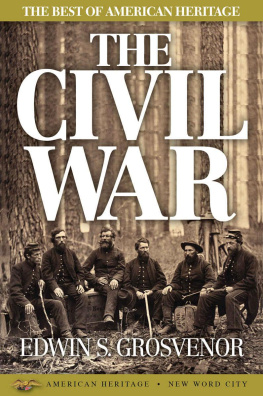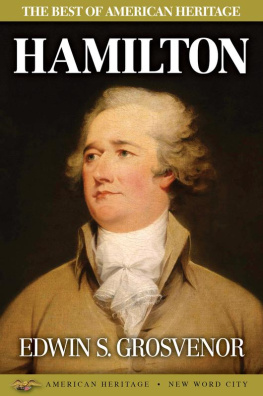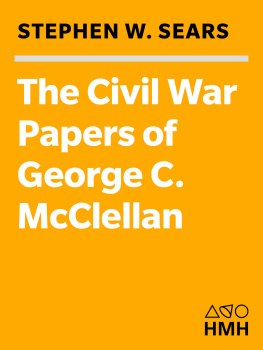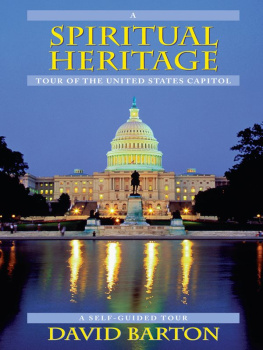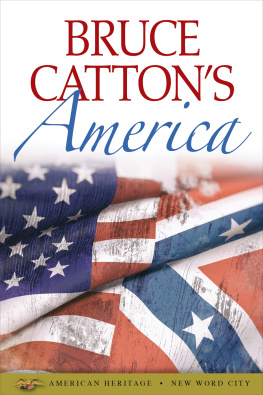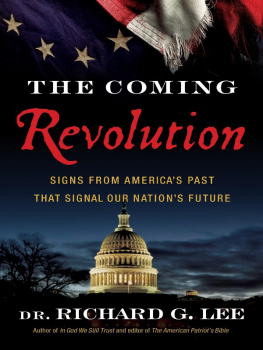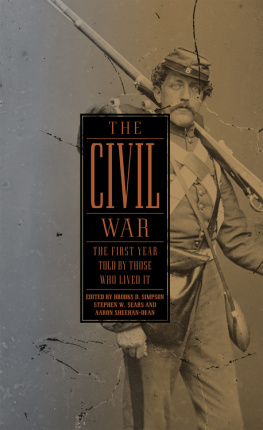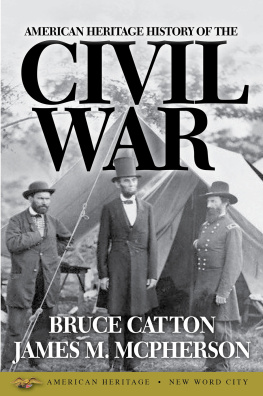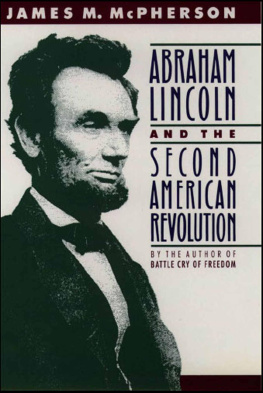For some Americans, the Civil War may seem like ancient history, a jumble of half-remembered events the bombardment of Fort Sumter , Picketts Charge at Gettysburg , Abraham Lincoln s Emancipation Proclamation and his assassination by John Wilkes Booth .
But the Civil War was an enormous and profound event that challenged the very existence of the United States. The attempt of Southern slave states to secede from the Union, coming only two generations after the nations founding, posed a critical test of the United States character, endurance, and will to survive. Oliver Jensen, one of American Heritages editors, wrote that the Civil War is Americas most monumental drama and morality tale. And within that larger drama were innumerable first-hand stories of courage, cunning, and loss. Civil War armies were the most literate that ever fought a war up to that time, writes historian James McPherson, while twentieth-century armies censored soldiers mail and discouraged diary keeping. Thus we have an unparalleled view of the Civil War by the people who experienced it.
Lincoln saw the Civil War as Gods punishment of North and South alike for the sin of slavery. If that were so, the penalty was severe. More than 600,000 Americans lost their lives, millions were maimed or had their property stolen or destroyed. Atlanta, Charleston, Columbia, and Richmond, along with countless small towns, were left in ruins.
So its not surprising that given its outsized importance in our nations history, the Civil War has always occupied an important place in the pages of American Heritage. One of the most acclaimed historians of the war, Bruce Catton , was the magazines founding editor. Catton attracted many other writers who also had insights and details to share about the Civil War.
As Cattons term as editor neared its end, David McCullough joined the staff. McCulloughs talent is evident in this volumes wonderful portrait of Harriet Beecher Stowe and the creation of Uncle Toms Cabin. When Stowes novel appeared in 1852, only a small minority of the country opposed slavery despite years of debate over the Fugitive Slave laws and the moral arguments of abolitionists. Stowes book changed the way the country thought and talked about slavery. In it, she humanized the plight of slaves. Within a year of publication, Uncle Toms Cabin sold more than 500,000 copies. Although Stowe wasnt a crusader, she had written the abolitionists manifesto, wrote McCullough. Senator Charles Sumner and many others credited the book with rousing the public to action and bringing about the election of Abraham Lincoln. Frederick Douglass praised the novel as a flash to light a million camp fires in front of the embattled hosts of slavery. Lincoln reportedly remarked that this is the little woman who started the war, when Stowe visited the White House a few years later.
Ever since the Civil War, observers have wondered if better political leadership could have averted the bloodshed and destruction and whether slavery would have collapsed on its own. In another chapter in the pages ahead, Columbia University historian Allan Nevins argues that the succession of three weak presidents between 1850 and 1861: Millard Fillmore, Franklin Pierce, and James Buchanan, who one contemporary called the damndest old fool that has ever occupied the presidential chair, could have contributed to the advent of the war. Could stronger and cannier leaders have somehow avoided the debacle? The greatest mistake a nation can make, Nevins warns, is to put at its helm an unprincipled man so pliable that he will palter with a clean-cut and momentous issue.
Certainly, one event that sped the nations movement to war was John Browns extraordinary attack on Harpers Ferry. In this volume, Thomas Fleming tells the story of the raid, the flawed trial that followed, and the hanging of the raiders. Fleming describes how, on October 16, 1859, Brown and twenty-one armed followers seized the federal arsenal at Harpers Ferry and converted it into a fortress. Brown believed that slaves in the surrounding area would run away from their owners to join his group - then he could declare his own Virginia government and lead a force of blacks and whites into the South, freeing more slaves along the way.
But, fearful of brutal reprisal from their owners, slaves failed to turn up at Harpers Ferry, and the next day, a Virginia militia drove Brown and his band out of the arsenal and into the adjacent fire-engine house. A firefight raged for a day and a half until all but seven of the raiders were killed, captured, or had fled.
Their exploits, as well as those of less revered military leaders, are brought alive in this book. Included here is Stephen Searss detailed and balanced portrait of Robert E. Lee. Sears writes that when a general asked one of Jefferson Daviss aides if he thought Lee had the ability to lead an army, he replied that Lee is audacity personified... His name is audacity.
Sears also paints a very different, but equally powerful, portrait of George B. McClellan , whose reluctance to engage in battle arguably prolonged the war for years and cost countless lives. McClellan seemed to be a strong, decisive commander, a general with an unmatched gift for organizing and motivating his troops, observes Sears. But in battle, he was all but paralyzed by a loss of will and a fear of defeat.
Another lesser-known general, George Henry Thomas , gets his due in these pages. Peter Andrews describes how Thomas, The Rock of Chickamauga and the strategist behind Northern victories in the Western theater, was crucial to the Unions success.
In Antietam , Bruce Catton describes in vivid detail the fateful day in September 1862 - the bloodiest day in American history when the war turned in favor of the North. In the entirety of the American Civil War, no single day was bloodier or more costly than that one day on the hills and fields overlooking Antietam Creek in western Maryland. A total of 22,717 lives were lost on this day.
The pages ahead are filled with vivid, sometimes quirky accounts of lesser-known characters, including the story of Belle Boyd , the glamorous Southern spy, and war correspondent G. W. Smalley. One chapter describes the miraculously speedy construction of the Norths ironclad warship, the USS Monitor, just in time to defeat the Confederate CSS Virginia and prevent Britain from siding with the South. Another illuminates the horrors of prison camps on both sides, highlighting the infamous Andersonville in Georgia.
R. N. Current tells us of the debate, even as the wars slaughter continued, over Lincolns plan to rebuild the shattered nation evoking another question: Could a leader different from Andrew Johnson have prevented the worst excesses of Reconstruction ?
The end of the war prompted the greatest parade in the nations history, with the Norths two victorious armies marching through Washington to the tireless cheers of its grateful citizens. Before that, however, came the tragedy that would shape the countrys course for a century to come: the assassination of Abraham Lincoln, reported in detail here by historian Philip B. Kunhardt, Jr.
The Civil War tested us as a nation like no other moment in our history, and the stories of heroism, folly, and suffering make for fascinating reading.
- Edwin S. Grosvenor

